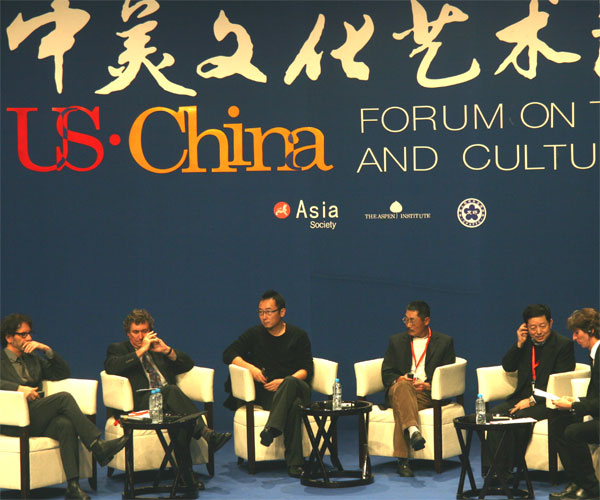Filmmakers look on to the future of movies
- By Wu Jin
 0 Comment(s)
0 Comment(s) Print
Print E-mail
China.org.cn, December 30, 2011
E-mail
China.org.cn, December 30, 2011
Rising Chinese filmmaker Lu Chuan, known for his epic "City of Life and Death," disclosed his long-time bafflement to iconic American movie director Joel Coen at the Sino-U.S. Cultural Forum in Beijing last month.
"Coen is one of my favorite directors," Lu said. "So I'd very much like to learn from his experience in how to keep his style unaffected in the massive industrialized wave in America."
"I thought (independence) is the most significant driving force for films to survive as an art form."
|
|
|
Joel Coen, David Fanning, Lu Chuan, He Ping, Jia Leilei and Damian Woetzel (L to R) |
However, the veteran Hollywood director behind internationally acclaimed films such as "Fargo," "Ladykiller" and "The Man Who Wasn't There" could only offer his experiences in a faraway domain.
He said the American film industry is broad enough for the directors, like, his brother Ethan Coen and himself, to work on independent projects. He said they were lucky enough not having to worry too much about the finances. "It doesn't matter with what industry it is," he said, "A certain amount of healthy distance from the industry is necessary."
However, according to He Ping, secretary-general of the Chinese Film Directors Guild and one of the panelists in the forum, Chinese filmmakers are not as fortunate.
"The directors in China take hard jobs," said He. "The (filmmaking) environment in China is somewhat different from that in the United States." According to He, the dichotomy derives from different social environments, political systems, government influences and censorship policies.
"Chinese filmmakers are overburdened on a narrow road," he said. "They constantly cast testing stones along the restricted odyssey… including the expressions of their emotions."
Yet the technological innovation raised the curtain for a new era when manufactured roadblocks gradually become relics of the past in front of the Internet, accessible film production software and direct-access services such as the Apple products. With an abundance of amateur films on the horizon, opportunities and challenges emerge for professional filmmakers.
"I talked with many younger directors, who produced a lot of home-made movies," Lu said. "Most of them made the stuff in hope to join in the major force of the circle." However, he said this trend merely spawns a mediocre industry.
According to Coen, although the technologies are available everywhere, the essence of the filmmaking craft still plays a key role. "It's a craft thing, it makes movies incredibly precious things," Coen said. The director said the craft is archaic and requires dexterous manipulation of rudimentary instruments.
However, David Fanning, founder and executive producer of Frontline, the longest investigative documentary series on American television, held a positive point when connecting technological development with China’s film industry. "As the tools become more and more accessible," said Fanning, "they will build the film more powerful and dramatic."
"Artistic ability begins to make impact (in China)," Fanning said.







Go to Forum >>0 Comment(s)